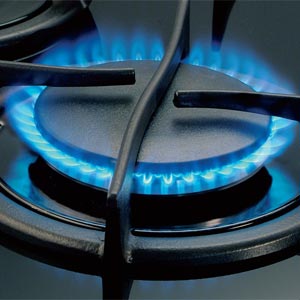Mains gas
Mains gas is the natural gas that is distributed to buildings through a pipeline infrastructure. In the UK, mains gas is supplied to more than 21 million homes and is the most popular fuel for heating and cooking.
Natural gas is mainly methane (CH4), but it also contains ethane, propane and some heavier hydrocarbons as well as small amounts of nitrogen, carbon dioxide, hydrogen sulphide and traces of water.
While the gas itself is owned by individual gas suppliers, all gas passes through the National Grid’s transmission system on its route to end users. As the owner and operator of the UK’s gas transmission infrastructure, the National Grid work with the gas suppliers to ensure delivery.
The National Grid undertake safety checks on all gas being received in their reception terminals, and add an odoriser to enable leaks to be detected by smell as it's colourless, tasteless and odourless.
It is the responsibility of the National Grid to ensure that the gas leaves the transmission system and enters the distribution networks at high pressure, where it is then transported through various reducing pressure tiers until being delivered to the end user. The UK has 8 regional distribution networks, of which 4 are owned by the National Grid, and the other 4 by separate companies.
The main elements involved in mains gas are:
- Production and importation: Gas is extracted from offshore fields in the North and Irish seas. It is also imported from other countries as liquefied natural gas (LNG).
- Transmission: Reception terminals receive gas from producers, which is then supplied to the national transmission system after quality checks.
- Distribution: Gas is transported in the distribution networks.
- Supply: Gas is delivered to the end user through a pipe owned by the local distribution network.
Around 15% of people in the UK are not connected to the mains gas grid, which can mean that their heating options are limited and therefore relatively expensive (sometimes twice the cost of a mains gas supply).
Some of the alternatives to mains gas include:
- Liquefied petroleum gas (LPG).
- Heating oil.
- Wood.
- Coal.
- Electricity.
- Renewable sources such as heat pumps, biomass, solar thermal, and so on.
[edit] Related articles on Designing Buildings Wiki
Featured articles and news
RTPI leader to become new CIOB Chief Executive Officer
Dr Victoria Hills MRTPI, FICE to take over after Caroline Gumble’s departure.
Social and affordable housing, a long term plan for delivery
The “Delivering a Decade of Renewal for Social and Affordable Housing” strategy sets out future path.
A change to adoptive architecture
Effects of global weather warming on architectural detailing, material choice and human interaction.
The proposed publicly owned and backed subsidiary of Homes England, to facilitate new homes.
How big is the problem and what can we do to mitigate the effects?
Overheating guidance and tools for building designers
A number of cool guides to help with the heat.
The UK's Modern Industrial Strategy: A 10 year plan
Previous consultation criticism, current key elements and general support with some persisting reservations.
Building Safety Regulator reforms
New roles, new staff and a new fast track service pave the way for a single construction regulator.
Architectural Technologist CPDs and Communications
CIAT CPD… and how you can do it!
Cooling centres and cool spaces
Managing extreme heat in cities by directing the public to places for heat stress relief and water sources.
Winter gardens: A brief history and warm variations
Extending the season with glass in different forms and terms.
Restoring Great Yarmouth's Winter Gardens
Transforming one of the least sustainable constructions imaginable.
Construction Skills Mission Board launch sector drive
Newly formed government and industry collaboration set strategy for recruiting an additional 100,000 construction workers a year.
New Architects Code comes into effect in September 2025
ARB Architects Code of Conduct and Practice available with ongoing consultation regarding guidance.
Welsh Skills Body (Medr) launches ambitious plan
The new skills body brings together funding and regulation of tertiary education and research for the devolved nation.
Paul Gandy FCIOB announced as next CIOB President
Former Tilbury Douglas CEO takes helm.
UK Infrastructure: A 10 Year Strategy. In brief with reactions
With the National Infrastructure and Service Transformation Authority (NISTA).























